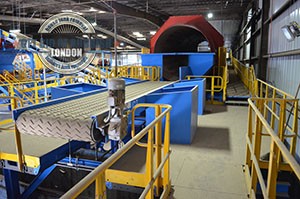 If ever wondered which and where is the biggest rubbish recycling plant in the world, the answer is the MRF facility managed by Republic Services, in Milpitas, California, US. The plant opened in twenty twelve and has a massive hundred and ten tonne per hour processing capacity. MRF stands for materials recovery facility which is exactly what the plant does – it recovers recyclables from commercial and residential rubbish. The California based recycling plant is a multiple waste stream facility, meaning the technology they use allows them to separate different recyclables from different streams of waste material. Site operators report an excess of four hundred thousand tonnes of waste processed over each twelve month period since its opening. This diverts as much as eighty percent of waste from ending up in landfills throughout the state.
If ever wondered which and where is the biggest rubbish recycling plant in the world, the answer is the MRF facility managed by Republic Services, in Milpitas, California, US. The plant opened in twenty twelve and has a massive hundred and ten tonne per hour processing capacity. MRF stands for materials recovery facility which is exactly what the plant does – it recovers recyclables from commercial and residential rubbish. The California based recycling plant is a multiple waste stream facility, meaning the technology they use allows them to separate different recyclables from different streams of waste material. Site operators report an excess of four hundred thousand tonnes of waste processed over each twelve month period since its opening. This diverts as much as eighty percent of waste from ending up in landfills throughout the state.
The MRF plant is a large scale operation in every respect. Situated in Newby Island Resource Recovery Park, the physical size of the facility is three hundred and forty two acres. The plant has its own rubbish removal company which collects waste material from homes and businesses throughout the district. It also has its own strictly controlled and managed landfill with a special system for gas emissions extraction. The plan also features an industrial composting site. The site’s own rubbish removal company operates seventy percent gas powered junk removal vehicles fuelled at a specialised gas station, also onsite and part of the MRF plant complex. The fuelling station is a CNG class installation, which is short for Compressed Natural Gas.
At the time of its opening, the MRF facility provided employment for nearly three hundred people. This makes the MRF plant good for the local economy as well as the environment.
Site operators say their recycling technology is not only highly efficient but also specially formatted so its capacity meets and even exceeds the green policy goals and initiatives set by communities in the state of California. MRF site operators aim to increase the amount of waste diverted from landfills through even more efficient recycling technology, planned to be put in operation in the very near future. Pretty much every piece of equipment and machinery across the MRF installation is custom built in order to meet the set criteria. Republic (site owner and operator) contracted a specialised engineering company called Bulk Handling Systems or BHS to design, manufacture, install and test all equipment used at the facility.
Although the costs of constructing and maintaining one such facility are substantial, local and national governments can draw immense benefits from such places and create new segments of economy which in turn support and sustain other sectors of the economy. The environmental benefits provided by waste processing facilities of this size and capacity are immense and will likely resonate for years, even generations to come. Recycling is both lucrative business and essential for the environment. Financing of such projects can be generated on an international level, through multilateral agreements between nations, through partnerships between private operators and public sector (national governments).
